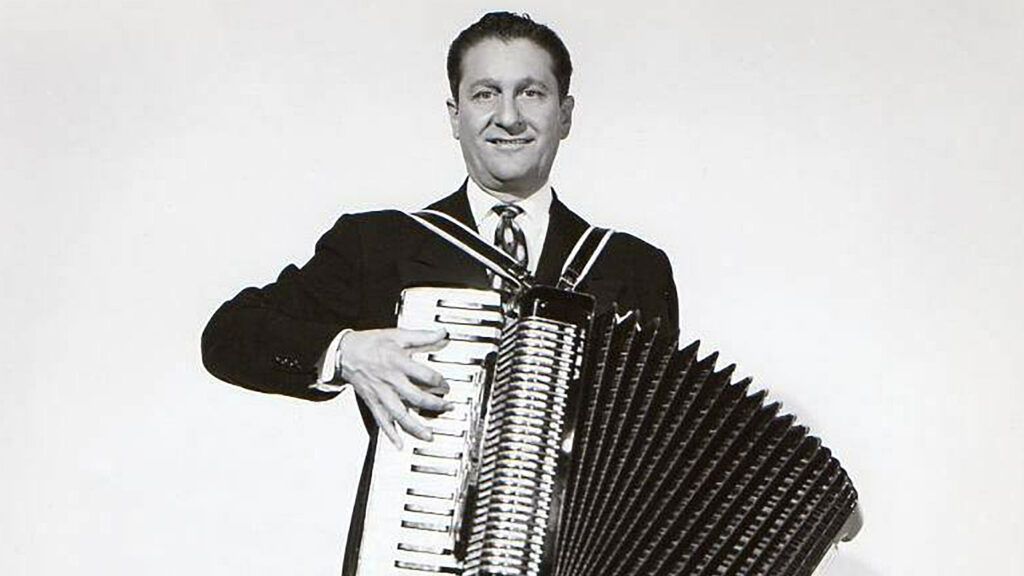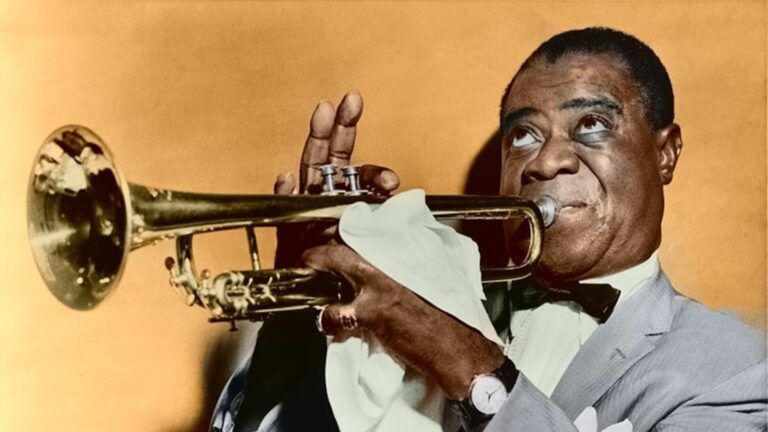Seventeen years ago, on a hot night in Chicago, I made my first attempt to say a few words in public. Before me was an outdoor dance floor crowded with people. Behind me were my musicians, tense but hopeful.
What would happen when I opened my mouth?
Our future bookings depended on those few words, or so I thought. For thirteen years, since I had formed my first “band,” consisting of one drummer and myself, we had been trying to make the Big Time.
This was it! The Edgewater Beach Hotel, on the shore of Lake Michigan, was the dream and goal of every Midwest orchestra.
While I was numb with shyness, it wasn’t stage fright. I had plenty of confidence in my music. But in my home town of Strasburg, North Dakota, I could simply nod to my friends, smile, play loud on my accordion without having to speak.
But here, I was supposed to be a polished master of ceremonies as well as a musician.
I shut my eyes tight and for a few minutes didn’t see or feel what was happening about me. “Lady and Gentlemens,” I began. Then came some faltering words about our “deep privilege.” When the speech was finished, I opened my eyes to find myself alone!
I was stunned, until I realized that a sudden summer thunder storm had driven my audience and musicians to cover, and that it was drenching me.
What little confidence I had gained in saying my speech dissolved completely. And the rest of our engagement at the Edgewater Beach Hotel, in my opinion, was a failure. I decided right then that to spend the rest of my life speaking publicly would be more than torture. It would be impossible.
Read More: Lawrence Welk on Overcoming Setbacks
Yet, two weeks later, when we opened in a Milwaukee theater for what seemed a staggering sum of money—somehow Lawrence Welk, the tongue-tied lad from a North Dakota farm with a German accent and faulty grammar, stood up and talked.
But during those 14 days before that Milwaukee engagement, which was the turning point in my life, I looked squarely at my fears and asked myself some direct questions.
First, was there something in my make-up to which I was attaching a wrong importance, something that made me feel self-conscious or inferior?
Of course there was: I had completed only the 4th grade in school, not at all unusual for the son of a North Dakota farmer.
When my father and mother escaped fom Alsace-Lorraine, in advance of the Prussian invasion, they brought with them, and passed on to their eight children, their deep fear of poverty. Among the homesteaders in our farm country, wealth was measured in productive land and a large family to work it.
It was natural that I should work on our farm as soon as I was old enough. What was unnatural was that a farm boy from a sod house should eventually stray off to the bandstand of the Edgewater Beach Hotel. It was then only, by comparison, that I felt inferior.
If I had no book learning, I had no musical education either. My father had an old fashioned accordion he had brought from Europe. I learned to play it catch-as-catch-can between farm chores.
But could I honestly say that my total education had been neglected?
No, it had not. My mother taught us constantly, by both word and example, the things she had found to be vital in life. We were a devout Catholic family and she taught us to pray, to be faithful in our devotions, to put God first.
If I missed school, I never missed church, and if necessary we drove our old horse and wagon through Dakota blizzards when we could barely see each other’s faces. If I didn’t know square root, I did know the infinite comfort and unity that stem from family prayers.
Did I have the love and concern of friends? Yes—and often.
George T. Kelly, a wonderful showman and friend, put a challenge to me very early in my career. Knowing that I was too shy even to announce my own numbers, he dressed me in a Spanish costume, let me smile, nod and play my accordion without so much as a word.
But when we were alone he talked to me very firmly.
“It’s all very well to be shy, Larry, me boy,” he said. “Maybe you were born that way. And I know all about your lack of formal education. But get the idea out of your head that this makes you anybody’s inferior. Where’s your faith, man?”
Were my desires honest and worthwhile ones? I felt they were. When I first played my accordion as a kid at a German wedding and watched the guests spin and glide to Old Country tunes, my greatest enjoyment was in seeing these people laugh and smile and have a good time.
In my heart I thought that life could hold no greater purpose than the giving of this joy to others.
Could I trust my motives? I hoped so. To check myself, however, I learned to make this comparison: as a musician I had a high respect for instruments; they had to be kept cleaned and tuned to produce harmony.
Similarly, I tried to keep my mind clean and in tune to God’s will, if my life was to be in harmony.
To search out my fears and face them, then, was an important step. To disarm my fears meant to see them in their proper perspective, and to be sure that both myself and my musical instrument were clean and properly tuned.
Yet even after making sure my own house was in order, I still was left with a genuine feeling of shyness. George Kelly had said maybe I was born that way. Maybe I was. What could I do about it?
Knowing for myself the very real suffering of the truly shy, I wish I could say that in those 14 days I overcame it, and thus could offer a sure solution for this problem.
But the fact is that I am just as shy today as I was 17 years ago—with this difference: the torture and misery are gone. I am not afraid of shyness anymore, because I found a way to live with it.
From experience, I can assure you that the lure of making lots of money won’t help one overcome shyness. Nor does success make it disappear. To this day, when all I’ve dreamed of, and more, has come my way, I am deeply hurt by my speaking mistakes.
Take what happened the other night, for example. Because of our bubbly, bouncy style of music, we are called the Champagne Music Makers. But I heard myself inform an audience that we were going to give them some “Shampoo Music.”
Even though my fans seemed tickled with my slip, I was miserable. Yet, I have found that this is not a pain that kills. Rather, this pain can bring growth.
For I have learned to come to terms with my own personality and fears, recognize my limitations and be myself. If this includes shyness, plus a mixed-up tongue, then I express that.
It means also I must literally try to “give myself away.” This is more than just getting myself off my mind, or getting unself-conscious. Any shy person will try to do that.
But the way to do it is to go into action, not dwell on my own questionable value, but confident that each of us has been given something to give away, and that someone is waiting to receive it.
Today, I have accepted my shyness just as I accept my height and the color of my hair. It is no disgrace to be shy unless we become inactive because of it. Since I’ve stopped fearing it, I have even found that shy people often have an extra something to give.
If shyness is turned inward and made a frustration or block, one may wind up with a bad inferiority complex.
But if shyness is faced honestly, divorced from self-consciousness, and grounded in a sincere attempt to follow Christ’s teaching, it can bring about a feeling of humility, gentleness, modesty and compassion.
Within my own heart, I would rather strive for these things than for all the self-confidence in the world.
I do not believe that I would have had the courage to face up to my shyness, however, had I not first recognized God as my Creator, shyness and all, Christ as my strength and example, and the Holy Spirit as my source of constant inspiration.
For more inspiring stories, subscribe to Guideposts magazine.





